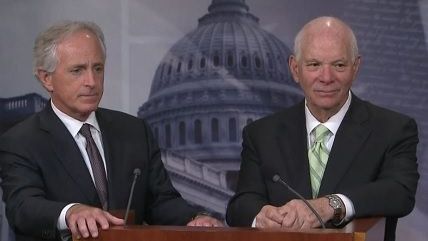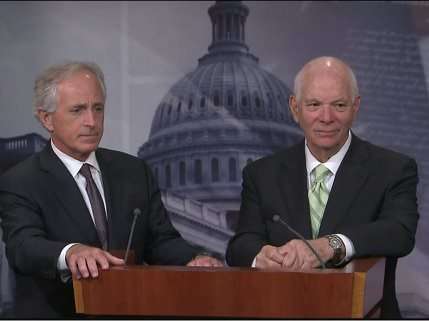Doesn't Matter If Iran Deal Goes to UN Before It Goes to Congress
Much ado about nothing


Vice President Joe Biden showed up on Capitol Hill today to meet with members of the Senate Foreign Relations Committee to talk about the deal negotiated with Iran in Vienna this week. That deal was the result of more than two years of negotiating between officials from Iran and the U.S., U.K, France, China, Russia, and Germany. It involves the lifting of a number of United Nations Security Council resolutions and placing Iran's nuclear programs within the purview of international inspectors.
At the meeting, Biden indicated the deal was on its way to the U.N. Security Council for that body to begin deliberating it. The deal must be approved by the Security Council in order to take effect. While all five permanent members were part of the talks, there are 10 other members of the Security Council. Assuming the U.S., U.K, France, China, and Russia vote yes, as opposed to present, the deal still needs the support of at least four other countries. The deal has to be approved by Congress—per legislation passed by that body and signed by the president, if Congress rejects the deal President Obama can veto their decision. If opponents of the deal have 2/3rd support, they can override the veto. The deal will also have to go through the domestic political process in Iran and the other countries involved.
Despite the several steps still needed just to begin implementing the deal, members of Congress are upset this multilateral deal may be considered by the Security Council before it's considered by Congress.
"We have a great concern with that," said Sen. Bob Corker, a Tennessee Republican who chairs the committee. "I think it's an affront to the American people … what this means is that they are agreeing to an agreement they don't even know if they can implement."
"I question the judgment of our president and the other members" involved in the negotiations in presenting this to the United Nations for approval when the American people haven't had a chance to take a hard look at its details and see what their members of Congress think about it, he told reporters after meeting with Biden.
The Ranking Democrat on the committee, Maryland Sen. Ben Cardin, also joined in:
"I think that the administration should wait until Congress has its review process," he said. "That issue did come up and we got into some of the historic differences between the executive and the legislative branches. Vice President Biden said it's not unusual for the administration to have different views on that than Congress."
Part of that Congressional delay, however, is a result of Congress' own legislation, which requires the Obama Administration not simply to submit the text of the deal to Congress, but to also submit supporting analyses from the State Department. Those take time but are not actually needed for members of Congress to make an informed decision—members of Congress are free to read the deal now. An analysis from the State Department seems unnecessary—a delay created by Congress. Turning around and getting upset because that delay means other bodies will move forward on considering the deal first seems disingenuous, though the overall interest by Congress to have a say in foreign policy for once is hopeful. This kind of engagement could've been useful after, say, the U.S joined the intervention in Libya. Back then Congress couldn't be bothered to pass any kind of substantive resolution on the subject. A substantive decision by Congress isn't guaranteed here either. If 60 days after the deal is submitted to Congress the Congress hasn't voted, the deal can move forward anyway.
Perhaps the biggest success in the Iran deal is that it illustrated that deals don't have to be bilateral. Six countries plus Iran participated in these talks. Maybe in the next talks over a security issue thousands of miles away, it might be fathomable for American policymakers for the U.S. not to participate at all. Critics of the deal who focus on Obama's perceived incompetence in negotiating or lack of interest in American security ignore that the deal was a multilateral one and so their Obama-centric complaints are flimsy. Countries like France, much closer to the range of potential Iranian nuclear weapons, didn't have an incentive to go along with a deal just because President Obama wanted one. They want with a deal because they, too, believed it was the best option. Congress should have a say in the deal—even if they've limited their involvement in the legislation they passed—but its members should understand Congress, and the U.S. government in general, is not the only one who gets to have a say.


Show Comments (43)